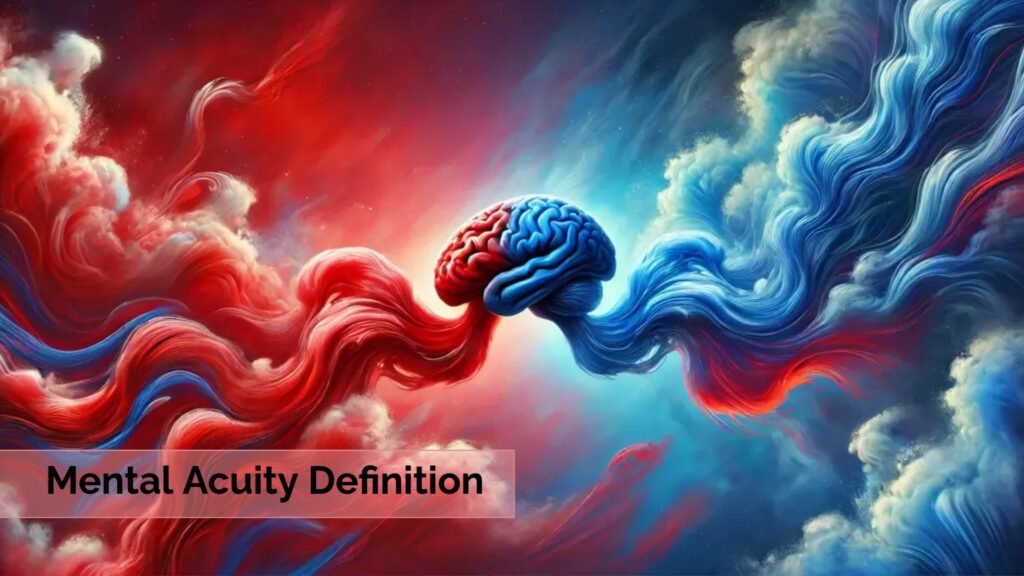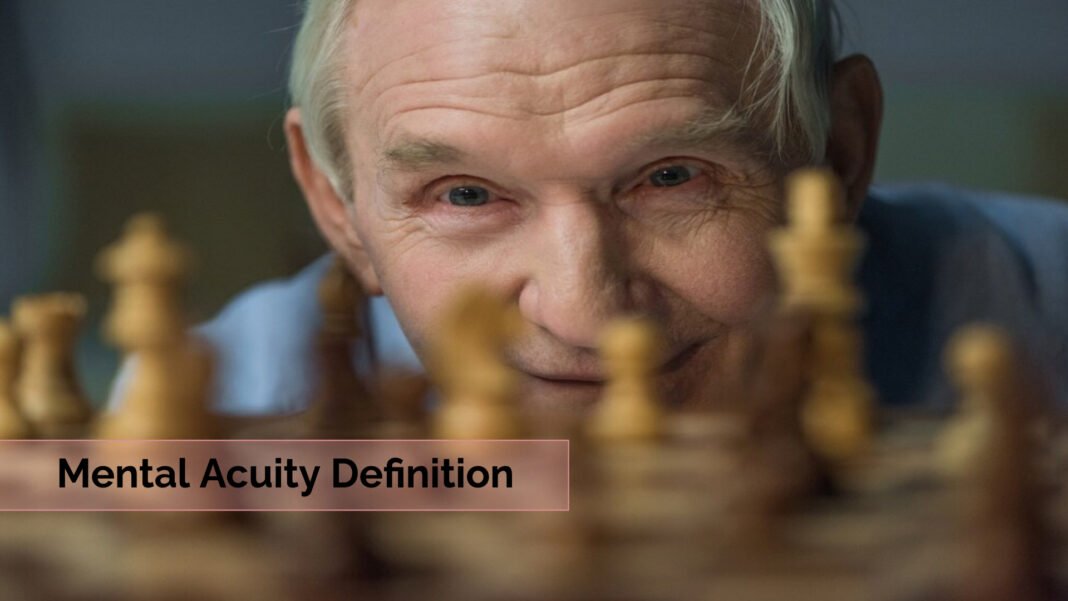Mental acuity is a term that encapsulates the sharpness and readability of the thoughts, reflecting how effectively we will think, examine, do not forget, and remedy troubles. In an age wherein cognitive performance is increasingly more connected to success in private and professional geographical regions, know-how intellectual acuity—its definition, influences, and implications—will become vital. This weblog post delves deeply into numerous components of mental acuity, including its definition, the impact of food plans and workouts, reasons for the decline, reminiscence garage mechanisms, and the jobs of crystallized and fluid intelligence. We may even explore how benchmarks help degree cognitive acuity and the effects of blue light on consciousness.
What Is Mental Acuity?
At its center, mental acuity refers to the mind’s capability to procedure statistics quickly and appropriately. It encompasses more than a few cognitive functions inclusive of reminiscence take into account, problem-fixing abilities, attention span, and basic highbrow overall performance. When we describe someone as having high mental acuity, we’re acknowledging their capability to think significantly and reply efficiently in diverse situations. Mental acuity can be encouraged by means of several elements along with age, way of life alternatives, genetics, and environmental conditions. It is not a static trait; instead, it is able to differ based on our daily conduct and reviews. For instance, carrying out mentally stimulating activities can decorate intellectual acuity over the years.
How Diet and Exercise Influence Memory Loss
- The Role of Diet: Nutrition plays a pivotal role in maintaining intellectual acuity. The mind calls for loads of vitamins to feature optimally. Diets rich in antioxidants, healthy fats, vitamins, and minerals are mainly beneficial for cognitive health. Here are some key nutritional components that help intellectual acuity:
- Omega-three Fatty Acids: Found in fatty fish (like salmon), walnuts, and flaxseeds, omega-3s are essential for mental health. They assist build cell membranes within the brain and have been associated with stepped-forward memory and cognitive feature.
- Antioxidants: Foods high in antioxidants inclusive of berries (blueberries, strawberries) combat oxidative stress which could damage brain cells. They may also enhance communique among neurons.
- Whole Grains: Whole grains offer a consistent supply of glucose to the mind. Foods like oats and brown rice can assist keep electricity tiers at some stage in the day.
- Leafy Greens: Vegetables like spinach and kale are filled with nutrients (consisting of Vitamin K) that have been linked to improved cognitive characteristics.

The Impact of Exercise
Physical pastime is equally critical for preserving mental acuity. Regular exercise increases blood flow to the mind, which promotes the growth of new neurons—a technique referred to as neurogenesis. Here are a few precise blessings of exercising cognitive function.
- Enhanced Mood: Exercise releases endorphins that improve mood and decrease feelings of anxiety or depression—situations that could negatively impact cognitive overall performance.
- Improved Sleep Quality: Regular bodily pastime can result in higher sleep patterns. Quality sleep is crucial for reminiscence consolidation and cognitive overall performance.
- Increased Brain-Derived Neurotrophic Factor (BDNF): Exercise stimulates the production of BDNF, a protein that supports neuron increase and survival. Higher tiers of BDNF are related to higher learning talents.
In precis, combining a nutrient-rich weight loss program with ordinary physical activity creates a sturdy basis for keeping mental acuity during lifestyle.
What Causes a Drop in Mental Acuity?
Despite our great efforts in weight loss programs and exercise, different factors can lead to a decline in intellectual acuity.
1. Age
As we age, herbal adjustments arise within our brains which can affect cognitive function. Some decline in memory and processing pace is normal; however, sizable drops can also imply underlying conditions which include dementia or Alzheimer’s disease.
2. Stress
Chronic stress could have unfavourable outcomes on brain health. High ranges of cortisol—a hormone released at some stage in pressure—can impair reminiscence formation and retrieval. Techniques such as mindfulness meditation or yoga can help mitigate stress results.
3. Sleep Deprivation
Lack of sleep seriously influences cognitive features inclusive of attention, problem-fixing talents, and memory retention. Sleep is vital for consolidating reminiscences formed for the duration of the day.
4. Medical Conditions
Certain clinical conditions together with diabetes or cardiovascular illnesses can have an effect on blood glide to the brain or result in neuroinflammation—both of which could impair cognitive functions.
5. Substance Abuse
Excessive alcohol intake or drug use can cause tremendous declines in mental acuity through the years due to neurotoxicity or nutritional deficiencies as a result of terrible way of life choices. Recognizing these elements is critical for taking proactive steps toward keeping intellectual acuity as we age.
What is Mental Acuity or is it Cognitive Acuity? (Potato — Pot[a]to)
The terms “mental acuity” and “cognitive acuity” are often used interchangeably; however, there are nuanced differences really worth noting:
- Mental Acuity: This time period typically refers back to the sharpness or clearness of thought procedures—how quickly one could assume on their feet or reply correctly to situations.
- Cognitive Acuity: This time period contains a broader range of cognitive capabilities which includes reasoning competencies, trouble-solving competencies, memory functions, and attention span.
While each term highlights aspects of cognitive overall performance, “cognitive acuity” may additionally suggest an extra complete view of average intellectual capabilities beyond simply velocity or readability of thought.
Memory Storage
Memory garage is necessary for information intellectual acuity. The brain encodes statistics via three number one techniques: encoding (preliminary learning), storage (maintaining records), and retrieval (recalling records).
Types of Memory
- Short-Term Memory: This kind of holds information quickly for immediate duties—generally lasting seconds to minutes.
- Long-Term Memory: Long-term reminiscence stores statistics indefinitely and includes specific memories (data and events) and implicit reminiscences (talents).
Factors Affecting Memory Storage
- Attention: Focusing interest on records complements encoding into long-time period reminiscence.
- Emotional State: Emotional studies tend to be remembered higher because of their importance.
- Repetition: Repeated exposure helps strengthen neural connections associated with particular reminiscences.
Techniques together with visualization or mnemonic gadgets can similarly enhance reminiscence retention by way of growing stronger associations with the cloth being found out.
The Sharpness of Mind — The Speed and Quality of Brain Responses
Mental acuity is characterized by using each pace and great when processing data.
Speed
The potential to suppose fast is regularly visible as a trademark of excessive mental acuity. Quick selection-making lets individuals respond successfully in dynamic environments—whether or not in enterprise negotiations or ordinary existence conditions.
Quality
However, pace on my own does no longer define intellectual acuity; satisfactory topics too. High-great responses contain vital questioning—reading records thoroughly earlier than arriving at conclusions. This balance between pace and niceness ensures powerful problem-solving skills.
Mental Acuity and Intellectual Capacity: Crystalized and Fluid Intelligence
Understanding how mental acuity pertains to exclusive varieties of intelligence presents deeper insights into cognitive performance.
Crystallized Intelligence
Crystallized intelligence refers to the understanding gained through enjoyment—inclusive of vocabulary or factual know-how received over the years. It tends to remain solid or even increase with age as individuals accumulate more information.
Fluid Intelligence
Fluid intelligence includes the ability to solve new troubles without relying on prior understanding—it displays adaptability in wondering patterns. Unlike crystallized intelligence, fluid intelligence can also decline with age but may be bolstered through continuous learning demanding situations like puzzles or method games. Both sorts contribute drastically to normal intellectual acuity; as a consequence fostering environments that inspire mastering throughout every age is vital for preserving sharpness of mind.
How Do Benchmarks and Baselines Help Measure Cognitive Acuity?
Establishing benchmarks for cognitive overall performance allows people to tune adjustments through the years correctly.
Importance of Benchmarks
Benchmarks offer reference factors against which one’s cognitive talents may be measured—assisting in identifying areas requiring development or intervention techniques that may beautify basic overall performance.
Assessment Tools
Various tools exist for measuring cognitive characteristics such as standardized checks (like IQ assessments), neuropsychological exams assessing specific domain names (reminiscence consider or government functioning), or maybe self-report questionnaires gauging perceived cognitive talents through the years. Regular checks allow individuals no longer only to reveal their development but additionally inspire proactive measures for keeping ultimate mental fitness thru centered interventions primarily based on identified weaknesses.

How Does Blue Light Affect Your Focus?
In today’s virtual age where monitors dominate our lives—from smartphones to computers—the consequences of blue mild exposure have garnered sizeable interest concerning focus.
Positive Effects During Daylight Hours
Natural blue light from sunlight complements alertness in the course of sunlight hours by way of regulating circadian rhythms—helping us feel wide awake when we need it most!
Negative Effects from Excessive Screen Time
However excessive exposure from displays—especially during night hours—can disrupt those rhythms leading to difficulties falling asleep at night time due basically due its interference with melatonin manufacturing (the hormone regulating sleep). This disruption in the end leads to no longer best fatigue but additionally impaired awareness tiers in the course of waking hours making it important for individuals running lengthy hours on screens to take ordinary breaks far from gadgets while also thinking about imposing blue-light-blockading glasses if necessary!



